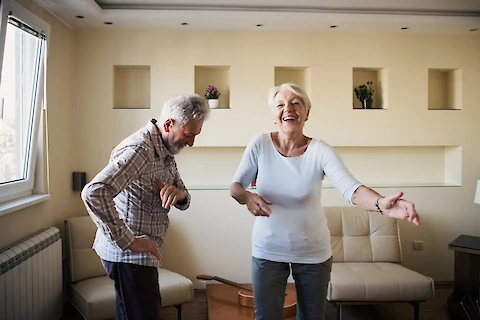
Music Therapy Provides Multiple Benefits for Seniors
Although music therapy was developed in the 1950s, it has become more commonly recognized and used in recent years. The therapeutic use of music is widespread in hospitals, adult care centers, and nursing homes. It's even beneficial to use it while caring for your elderly loved ones in your Michigan City home.
According to an American Music Therapy Association fact sheet, music can be helpful for people who resist other approaches. "Music is a form of sensory stimulation, which provokes responses due to familiarity, predictability, and feelings of security associated with it," it states.
Benefits of music for people with Alzheimer's disease or dementia
The American Music Therapy Association says the benefits of music for people with Alzheimer's Disease or other forms of dementia include the following:
-
Music reduces depression among older adults.
-
Music can enhance social and emotional skills, help with recall and language skills, and decrease problem behaviors.
-
Music soothes, and thus decreases agitation and aggression for people with Alzheimer's disease or dementia.
-
People in the late stages of dementia, who may respond to little else, will respond to and interact with music.
Music therapy vs. using music therapeutically
Music therapy is used by a trained and certified therapist to help patients achieve specific physical, emotional, cognitive, or social goals, and is prescribed by a physician along with other treatments. If you'd like to locate a music therapist in the Michigan City area, visit the American Music Therapy Association website. In some cases, it may be covered by insurance as active therapy, if it's part of a treatment plan prescribed by a physician. You can contact your local Medicaid office to inquire.
But using music therapeutically is easy for any caregiver. In an AARP article, "The Power of Music: Sounds that Heal," Sally Abrahms says research shows music has a positive impact on people with depression, Tourette syndrome, Huntington's disease, autism, Parkinson's disease, stroke, brain injury, and cardiac disease. It can help manage pain, anxiety, and stress. Music even benefits caregivers.
Tips for using music in everyday caregiving
The key to using music in your loved one's routine is to pick music that speaks to them. Find a genre that links into happy memories or emotions. Older adults tend to respond to music from their childhood or teens to 20s, or religious music. Be mindful that loud or frenetic music may be distracting or upsetting. Listen to something that has a predictable rhythm and melody.
Suggested playlists for older adults, organized by music genre and purpose, are available at the AARP link. It also has music apps that can be used on your phone or tablet.
Preschool teachers know that music eases transitions from one activity to another and that it reinforces everyday routines. You can use it the same way. Try calm, quiet music for wake up or bedtime. Choose something a bit more upbeat while getting up and prepped for the day. Anyone who has difficulty moving, speaking, or comprehending words will benefit from using music to create predictable routines.
Other ways to use music
-
Instead of sitting back and listening, try making music. How about a sing-along? Singing familiar songs works memory and language recall—some patients who have difficulty saying words have no problem singing them.
-
Keep the beat. You can use drums, but it's also easy to use empty cardboard or plastic containers, bells, keys, the armrest on the chair, or lightly pat your loved one's knee or back in time to the music. If this is successful, check out drum manufacturer Remo's website to learn about their Health Rhythms drumming programs and training schedules. It explains how the drum can be an excellent tool for communicating, expressing emotion, reducing anxiety, stress, and depression, and improving mood. And it's a fun way to bond with others.
-
Use movement. People who struggle with regular movement may be more willing and able to dance to music. Instead of insisting that your elderly mom or dad get up and get to the bathtub, try turning on music and dancing them there. Walking while listening to music may help distract from discomfort or pain and keep them moving longer. If they are unable to stand, moving to music with scarves, marching their feet to the beat, or swaying their arms to conduct the music may get them moving in their chair. Music is a powerful motivator.
-
Play music as part of guided imagery, relaxation, or meditation.
-
Use music as a memory aid. All those childhood songs that helped you learn your ABCs and 123s are still fused in your brain because they were created as memory aids. Use those songs to recall familiar words, or create your own short tunes to help your loved one recall important information or routines.
The benefits of music are plentiful. Music can help tap memories and reduce anxiety, pain, heart rate, and blood pressure. Music can speed healing, boost learning, improve brain function, and increase social interaction. And music is easy to incorporate into everyday routines, so give it a try!
If you need information or resources to care for your elderly loved one at home, Senior Helpers in Michigan City is ready to serve. Please contact us for more information about caring for seniors throughout the Northeast Indiana area.